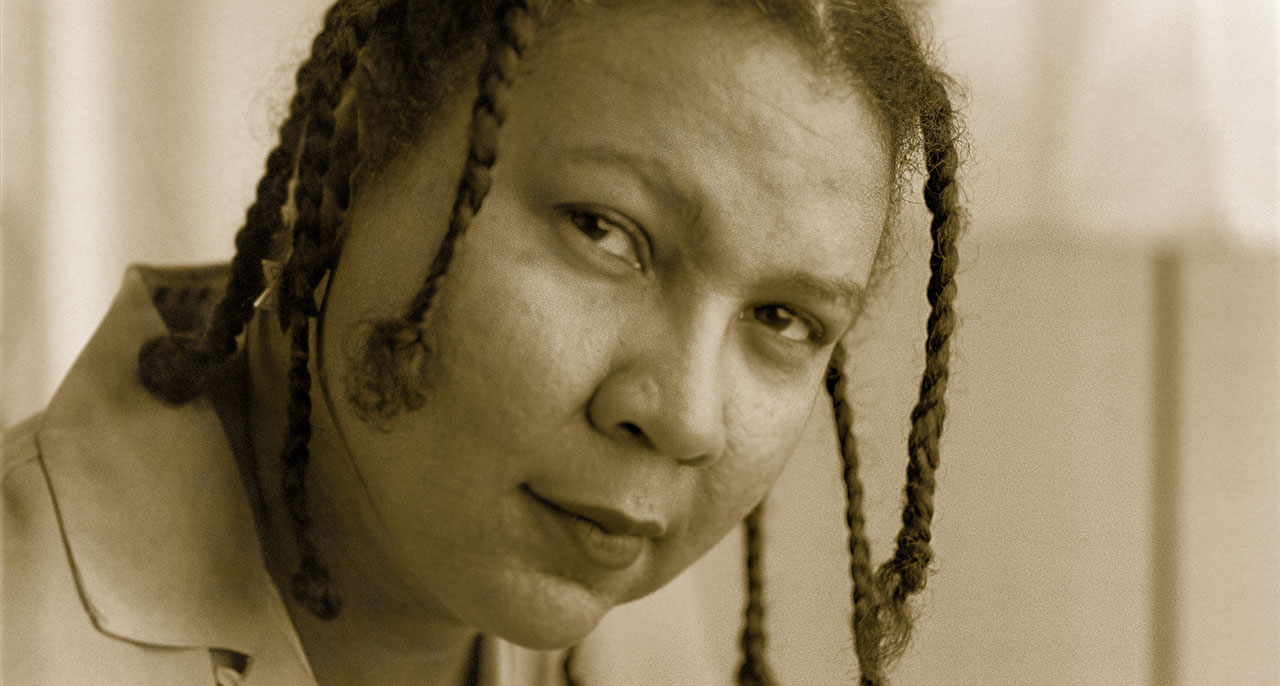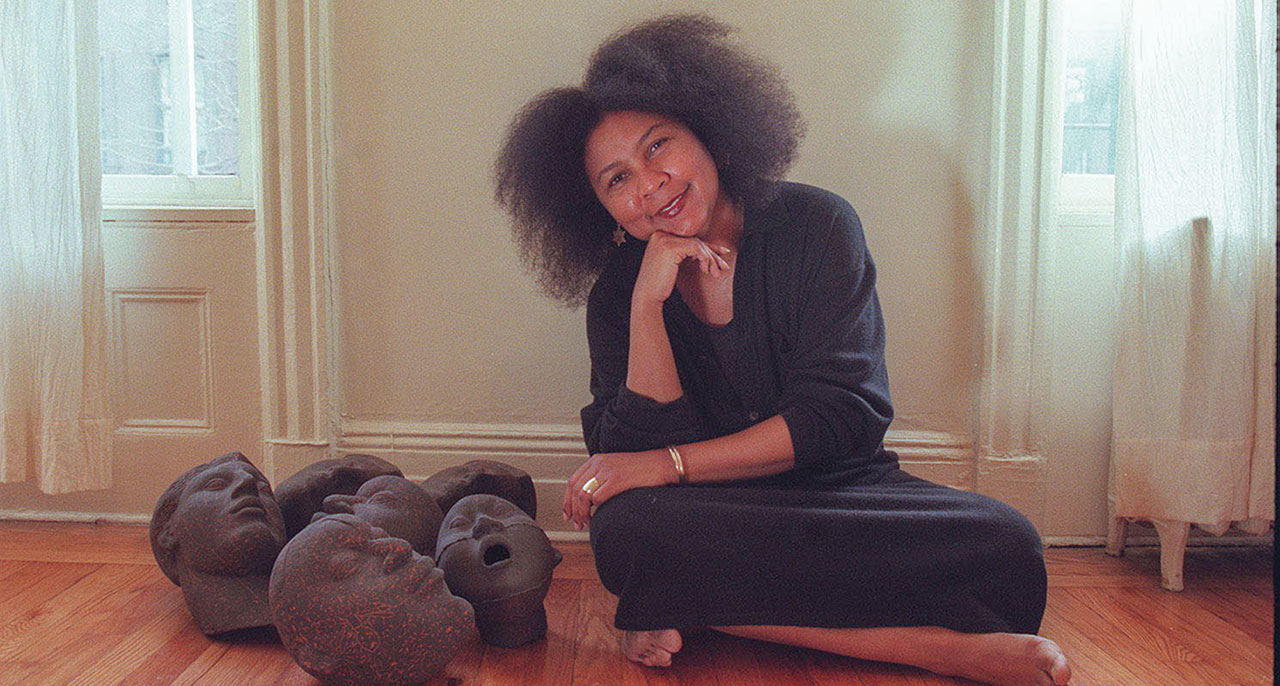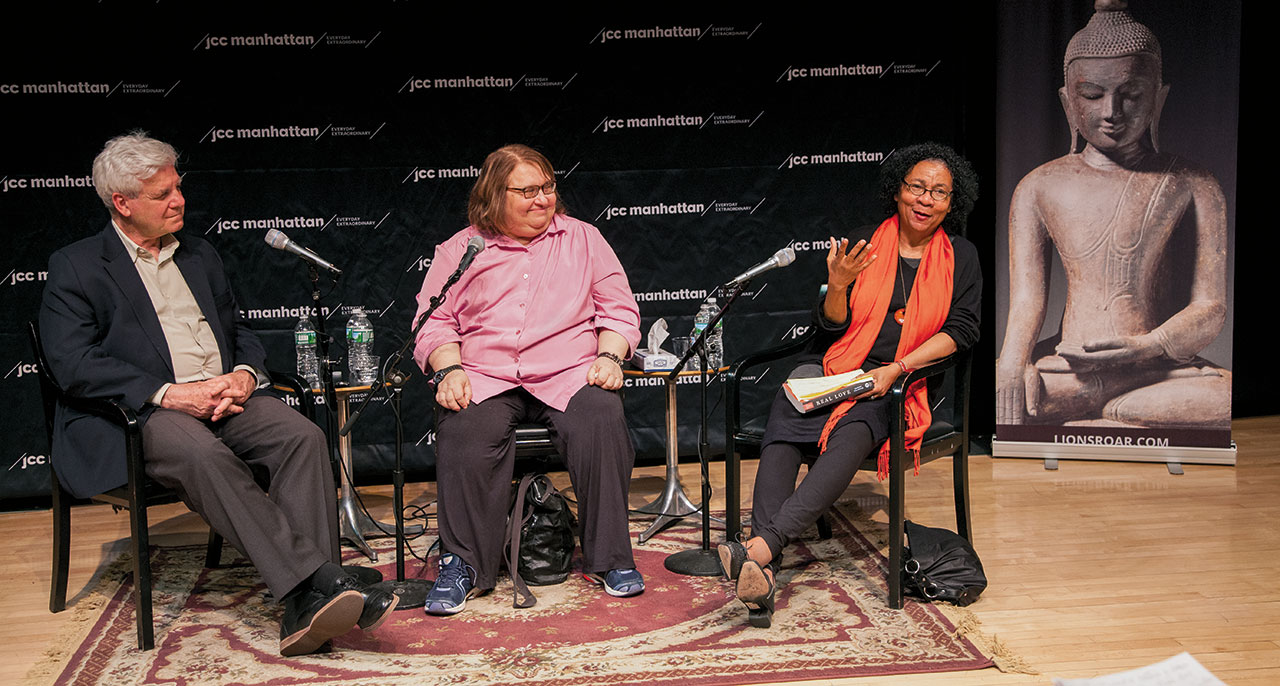In December, the world misplaced one other highly effective voice for love and justice, the seminal thinker and author bell hooks. hooks made historic contributions in lots of fields, from feminism and race to political concept and cultural criticism, however for her it at all times got here all the way down to the selection we face between love and domination. On this necessary essay, she conjures up us to make her imaginative and prescient of a tradition of affection come true.

From Ain’t I a Lady?: Black Girls and Feminism, the ground-breaking guide she began writing at age 19, via works akin to All About Love, Bone Black, and Educating to Transgress, bell hooks was one of the influential progressive thinkers of our time. A working towards Buddhist, she was a frequent contributor to Lion’s Roar. Picture by Karjean Levine / Getty Photos
Basically, the apply of affection begins with acceptance—the popularity that wherever we’re is the suitable place to apply, that the current second is the suitable time. However for therefore many people, our longing to like and be cherished has at all times been a couple of time to return, an area sooner or later when it’ll simply occur, when our hungry hearts will lastly be fed, once we will discover love.
Greater than thirty years in the past, after I first started to consider Buddhism, there was little or no discuss Buddhism and love. Being a Buddhist was akin to being a leftist: it was all in regards to the mind, the philosophical thoughts. It was a religion for the pondering “man,” and love was nowhere to be discovered within the widespread Buddhist literature at the moment. In circles the place a person would dare to talk of affection, they’d be advised that Buddhists had been extra involved with the problem of compassion. It was as if love was simply not a related, severe topic for Buddhists.
Through the turbulent sixties and seventies the subject of affection had made its option to the political forefront. Peace activists had been telling us to “make love not battle.” And the nice preacher Martin Luther King, Jr., elevated the decision to like from the hidden longing of the solitary coronary heart to a public cry. He proclaimed like to be the one efficient option to finish injustice and produce peace, declaring that “In the end all of the individuals of the world should uncover a option to reside collectively in peace.… If that is to be achieved, man should evolve for all human battle a technique which rejects revenge, aggression, and retaliation. The muse of such a technique is love.”
There couldn’t have been a extra excellent historic dharma second for religious leaders to talk out on the problem of affection. Little question divine windfall was at work within the universe when Martin Luther King, Jr., and a little-known Vietnamese Buddhist monk named Thich Nhat Hanh, discovered themselves strolling the identical path—strolling towards each other—engaged in a apply of affection. Younger males whose hearts had been awakening, they created in mystical moments of sacred encounter a symbolic sangha.
They affirmed each other’s work. Within the loneliness of the midnight hour, King would fall on his knees and ask himself the query, “How can I say I worship a God of affection and help battle?” Thich Nhat Hanh, figuring out by coronary heart all of the bonds of human connection that battle severs, challenged the world to assume peace, declaring within the wake of the Vietnam Struggle that he “thought it was fairly plain that if you need to select between Buddhism and peace, then you could select peace.” Linking Buddhism with social engagement, Thich Nhat Hanh’s work attracted Westerners (myself included) exactly as a result of he provided a religious imaginative and prescient of the universe that promoted working for peace and justice.

hooks in her condominium in New York’s West Village, the place she lived for a few years earlier than returning to her native Kentucky to show at Berea Faculty, now dwelling of the bell hooks Institute. Picture by Joyce Dopkeen / The New York Instances
Considerably, Buddhism started to draw many extra Western followers as a result of it linked the wrestle for world peace with the will of every particular person to be engaged in significant religious apply. Popping out of a time when it had been cool for good individuals to be agnostic or atheist, individuals needed permission to hunt religious connection.
For a lot of Western seekers, the sensation that we had didn’t create a tradition of peace and justice led us again to an introspective search of our intimate relations, which as a rule had been messy and stuffed with strife, struggling, and ache. How might any of us really consider that we might create world peace once we couldn’t make peace in our intimate relationships with household, companions, pals, and neighbors?
Responding to this collective anguish of spirit, visionary academics (like King, Thich Nhat Hanh, the Dalai Lama, Sharon Salzberg) had been moved by religious necessity to talk extra instantly in regards to the apply of affection. Proclaiming transformation in his consciousness engendered by a give attention to love, Thich Nhat Hanh declared within the poem “The Fruit of Consciousness Is Ripe”: after I knew tips on how to love the doorways of my coronary heart opened large earlier than the wind. / Actuality was calling out for revolution. That spirit of revolution, that decision to apply transformative love, captured my important creativeness and merged with my longing to discover a loving associate.
When lecturing on ending domination all over the world, listening to the despair and hopelessness, I requested people who had been hopeful to speak about what power of their life pushed them to make a profound transformation, shifting them from a will to dominate towards a will to be compassionate. The tales I heard had been all about love.
That sense of affection as a transformative energy was additionally current within the narratives of people working to create loving private relationships. Writing about metta, “love” or “loving-kindness,” as the primary of the brahmaviharas, the heavenly abodes, Sharon Salzberg reminds us in her insightful guide Lovingkindness: The Revolutionary Artwork of Happiness that “In cultivating love, we bear in mind one of the highly effective truths the Buddha taught…that the forces within the thoughts that carry struggling are capable of quickly maintain down the optimistic forces akin to love or knowledge, however they will by no means destroy them.… Love can uproot worry or anger or guilt, as a result of it’s a higher energy. Love can go anyplace. Nothing can impede it.”
Due to the notice that love and domination can not coexist, there’s a collective name for everybody to position studying tips on how to love on their emotional and/or religious agenda. We have now witnessed the best way by which actions for justice that denounce dominator tradition, but have an underlying dedication to deprave makes use of of energy, do probably not create elementary adjustments in our societal construction. When radical activists haven’t made a core break with dominator pondering (imperialist, white supremacist, capitalist patriarchy), there isn’t a union of concept and apply, and actual change just isn’t sustained. That’s why cultivating the thoughts of affection is so essential. When love is the bottom of our being, a love ethic shapes our participation in politics.
To work for peace and justice we start with the person apply of affection, as a result of it’s there that we will expertise firsthand love’s transformative energy. Attending to the damaging affect of abuse in a lot of our childhoods helps us domesticate the thoughts of affection. Abuse is at all times about lovelessness, and if we develop into our grownup years with out figuring out tips on how to love, how then can we create social actions that can finish domination, exploitation, and oppression? John Welwood shares the perception in Good Love, Imperfect Relationships that many people carry a “wound of the center” that emerged in childhood conditioning, creating “a disconnection from the loving openness that’s our nature.” Welwood hyperlinks particular person failure to learn to love in childhood with bigger social ills; nonetheless, even those that are lucky to like and be cherished in childhood develop to maturity in a tradition of domination that devalues love.

“I see love as a mix of six substances: care, dedication, data, duty, respect, and belief,” stated hooks on this dialog about The Energy of Actual Love with Buddhist instructor Sharon Salzberg, moderated by Lion’s Roar editor-in-chief Melvin McLeod. Picture by Christine Alicino
Being loving can truly lead one to be extra at odds with mainstream tradition. Despite the fact that, as Riane Eisler explains in The Energy of Partnership, our “first classes about human relations should not discovered in workplaces, companies, and even colleges, however in mum or dad–baby and different relations,” these habits of being should not shaped in isolation. The bigger tradition in our nation shapes how we relate. Any baby born in a hospital first experiences life in a spot the place non-public and public merge. The interaction of those two realities will probably be fixed in our lives. It’s exactly as a result of the dictates of dominator tradition construction our lives that it’s so troublesome for like to prevail.
After I started, years in the past now, to give attention to the facility of affection as a therapeutic power, nobody actually disagreed with me. But what they proceed to simply accept of their each day life is lovelessness, as a result of doing the work of affection requires resisting the established order. In Thich Nhat Hanh’s treatise on the topic, True Love: A Apply for Awakening the Coronary heart, he reminds us that “to like, within the context of Buddhism, is above all to be there.” He then raises the query of whether or not or not we’ve time for love. Proper now there may be such a profound collective cultural consciousness that we have to apply love if we’re to heal ourselves and the planet. The duty awaiting us is to maneuver from consciousness to motion. The apply of affection requires that we make time, that we embrace change.
Basically, to start the apply of affection we should decelerate and be nonetheless sufficient to bear witness within the current second. If we settle for that love is a mix of care, dedication, data, duty, respect, and belief, we will then be guided by this understanding. We will use these skillful means as a map in our each day life to find out proper motion. Once we domesticate the thoughts of affection, we’re, as Sharon Salzberg says, “cultivating the great,” and which means “recovering the incandescent energy of affection that’s current as a possible in all of us” and utilizing “the instruments of religious apply to maintain our actual, moment-to-moment expertise of that imaginative and prescient.” To be remodeled by the apply of affection is to be born once more, to expertise religious renewal. What I witness each day is the eager for that renewal and the worry that our lives will probably be modified completely if we select love. That worry paralyzes. It leaves us caught within the place of struggling.
Once we commit to like in our each day life, habits are shattered. We’re essentially working to finish domination. As a result of we now not are enjoying by the protected guidelines of the established order, guidelines that if we obey assure us a selected final result, love strikes us to a brand new floor of being. This motion is what most individuals worry. If we’re to provoke the collective eager for religious well-being that’s discovered within the apply of affection, we should be extra prepared to establish the varieties that longing will soak up each day life. Of us must know the methods we alter and are modified once we love. It’s only by bearing concrete witness to like’s transformative energy in our each day lives that we will guarantee those that are fearful that dedication to like will probably be redemptive, a option to expertise salvation.
Numerous individuals take heed to and affirm the phrases of visionary academics who converse on the need of affection. But they really feel of their on a regular basis lives that they merely have no idea tips on how to hyperlink concept and apply. When Thich Nhat Hanh tells us in Transformation and Therapeutic that “understanding is the very basis of affection and compassion,” that “if love and compassion are in our hearts, each thought, phrase, and deed can carry a couple of miracle,” we’re moved. We could even really feel a strong surge of consciousness and chance.
Then we go dwelling and discover ourselves unsure about tips on how to notice real love. Discovering methods to precise real love requires vigilance, persistence, a will to let go, and the artistic use of the creativeness to invent new methods of relating. Thich Nhat Hanh advised me to see the apply of affection in a tumultuous relationship as religious apply, to search out within the thoughts of affection a option to understanding, forgiveness, and peace. In fact this was all work. Simply as cultivating a backyard requires turning over the bottom, pulling weeds, planting, and watering, doing the work of affection is all about taking motion.
Every time anybody asks me how they will start the apply of affection, I inform them giving is the place to begin. In The Return of the Prodigal Son, Henri Nouwen gives this testimony: “Each time I take a step within the path of generosity I do know that I’m shifting from worry to like.” Salzberg sees giving as a option to purify the thoughts: “Giving is an inward state, a generosity of the spirit that extends to ourselves in addition to to others.” By way of giving we develop the thoughts of gratitude. Giving allows us to expertise the fullness of abundance—not solely the abundance we’ve, however the abundance in sharing. In sharing all that we’ve we turn out to be extra. We awaken the center of affection.
Dominator pondering and apply depends for its upkeep on the fixed manufacturing of a sense of lack, of the necessity to grasp. Giving love gives us a option to finish this struggling—loving ourselves, extending that like to all the pieces past the self, we expertise wholeness. We’re healed. The Buddha taught that we will create a love so robust that, as Salzberg states, our “minds turn out to be like a pure, flowing river that can’t be burned.” Such love is the inspiration of religious awakening.
If we’re to create a worldwide tradition of affection then we’d like enlightened academics to information us. We want concrete methods for working towards love within the midst of domination. Think about all that may change for the higher if each neighborhood in our nation had a middle (a sangha) that may give attention to the apply of affection, of loving-kindness.
All the nice non secular traditions share the idea that love is our purpose for being. All of us who work towards making a tradition of affection search to share an actual physique of educating that may attain everybody the place we’re, extending the circle of affection past boundaries, bringing collectively individuals from completely different backgrounds and traditions, and feeling collectively the best way love connects us.

